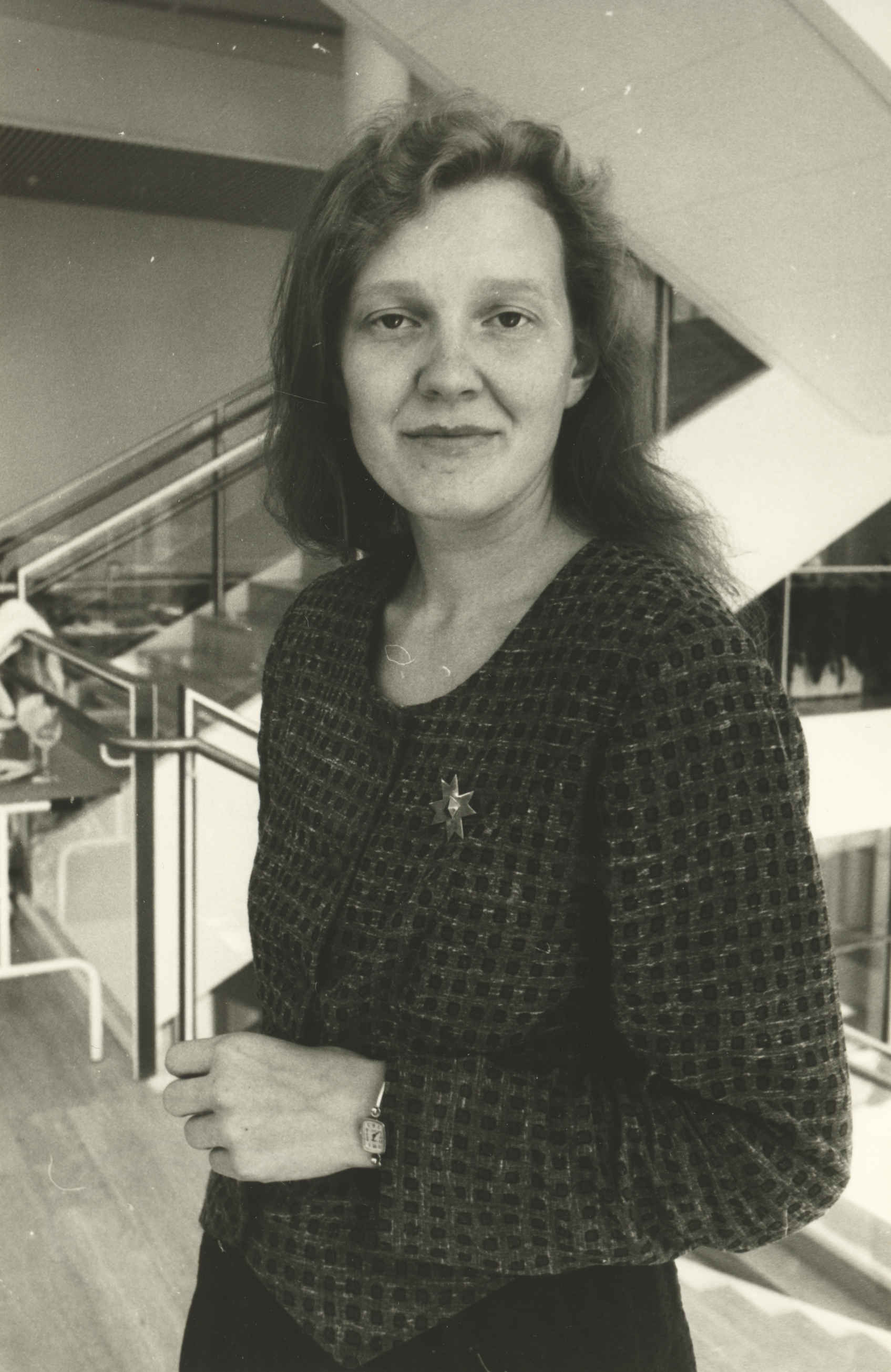
Kauksi Ülle
Kauksi Ülle (given name Ülle Kauksi, b. 23. IX 1962) is a poet and prose writer.
Kauksi Ülle was born in Võru, educated in Rõuge and Võru as well as the department of journalism at the State University of Tartu, where she graduated in 1986. She has worked for the journal Kultuur ja Elu, for Võru Radio, and at the Fenno-Ugria foundation. She joined the Tartu NAK (Young Authors’ Association) in 1984 and the Writers’ Union in 1990. She has won the Bernard Kangro literature award (1992), the Order of the White Star, class IV (2006), the Woman of the Year title (2008) and the Juhan Liiv poetry prize for the poem Imäpuu (‘Mother Tree’, 2019).
Kauksi Ülle has been publishing poetry since 1980. Her first collection Kesk umma mäke [‘In the Midst of One’s Own Hill’] appeared in 1987. She is one of the most outstanding cultivators of Võru dialect poetry, and rose to prominence at the end of the eighties representing the Võro movement. Kauksi Ülle belonged to the Hirohall and Eesti Kostabi $elts literary groupings, which promoted an ‘ethno-futurism’ that united heritage with modern culture. The world-view of the traditional village society, close to nature, has a significant role in Kauksi Ülle’s work, mingling inherited subject matter with the modern world.
Themes from international myths are linked to the folk poetry tradition in the ballad collections Hanõ vai luigõ (‘Geese or Swans’, 1989), Agu ni Eha, Morn and Eve (1995, with a parallel text in English), Kuldnaanõ. Kultanainen (‘Golden Woman’, 1997, with a parallel text in Finnish) and Nõsõq rõõmu mõrsija (‘Rise, Bride of Joy’, 2001, which is shot through with motifs of life and death, love and fate. Personal subject matter is found in the poetry collection Käänüpäev (‘Solstice’, 2003, Gustav Suits poetry prize). A significant role in her work is played by ‘immaimmamaa’ (‘Grandmotherland’), and ‘vanaimä’ (grandmother) as the fosterer of traditions and values.
The same applies to her prose: in her collection of short prose Säng (‘Bed’, 1997) and Huuv (‘Backyard’, 2000) and her novels. In the latter she concentrates on woman’s life and choices, with an important place being given to sexuality and social norms. Paat (‘The Boat’, 1998) depicts the life of a village woman from the forties to the nineties, dealing among other things with the dissolution of the traditional village way of life, and Uibu (‘The Apple-tree’, 2003), concerns the life of a contemporary woman in economic difficulties. A woman’s life has a central place also in the play Taarka (2004) about the Setu bardic singer Hilana Taarka. Kauksi Ülle’s text was the basis of a feature film of the same name (2008, directed by Ain Mäeots).
A. K. (Translated by C. M.)
Books in Estonian (incl. Võru)
Poetry collections
Kesk umma mäke. Tallinn: Eesti Raamat, 1987, 71 lk.
Hanõ vai luigõ: tossin lugulaulu. Tartu: Almanaki Raamatukogu, 1989, 68 lk.
Jyriyy; Kirotõtu Tarton ja Võron. Tallinn: Eesti Raamat, 1991, 107 lk.
Agu ni Eha. Morn and Eve. Tartu: Elmatar, 1995, 96 lk.
Kuldnaanõ. Kultanainen. Helsingi: Taifuuni, 1996, 143 lk.
Nõsõq rõõmu mõrsija. Tartu: Kauksi Ülle Mänedsment, 2001, 127 lk.
Emaemamaa: valik luuletusi 1987-2003. Tallinn: Eesti Keele Sihtasutus, 2003, 155 lk.
Käänüpäiv. Obinitsa: Kauksi Ülle Mänedsment’, 2003, 197 lk.
Palunõiaq. Obinitsa: Seto Ateljee-Galerii, 2012, 90 lk.
Valit luulõq: luulõtuisi aastist 1980-2005. Obinitsa: Seto Ateljee Galerii, 2012, 365 lk.
ObiNizza: luulõtuisi aastist 2012-2017. Pärnu: Jumalikud Ilmutused, 2017, 70 lk.
Imäpuu: inämbüs luulõtuisi aastast 2018. Pärnu: Jumalikud Ilmutused, 2018, 78 lk.
Novels
Paat. Tartu: Eesti Kostabi Selts, 1998, 152 lk.
Uibu: jutus uibudsõst näiokõsõst, ikk rigudi-rägudi riigikesest 1990-2002. Tarto: Kauksi Ülle Mänedsment, 2003, 151 lk.
Ülim tõde. Saarde, Pärnu: Jumalikud Ilmutused, 2014, 141 lk.
Short prose
Säng. Tartu: Eesti Kostabi Selts, 1997, 59 lk.
Huuv: lühijutud. Tartu: Eesti Kostabi Selts, 2000, 57 lk.
Iti ja kuningriik. Obinitsa: Seto Ateljee-Galerii, 2020, 32 lk.
Plays
Taarka: kolmtõist kaehtust Hilana Taarka poolõ. Tartu: Kauksi Ülle Mänedsment, 2004, 128 lk.
Kuus tükkü. Obinitsa: Hal’as Kunn, 2006, 159 lk.



